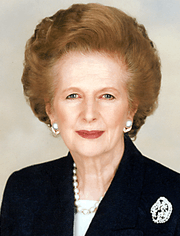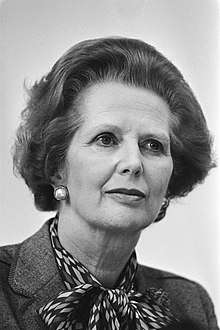Wets and dries
During the 1980s, members of the Conservative Party in Britain who opposed some of the more hard-line policies of Prime Minister Margaret Thatcher were often referred to by their opponents as "wets". Thatcher coined the usage in 1979–80, with the meaning of feeble, lacking hardness, or willing to compromise with the unions.[1] The label was especially applied to senior members of her government who were nevertheless outside Thatcher's inner circle and who expressed opposition to her strict monetarist policies designed to tackle inflation, and her cuts to public spending.[2]
| Part of the politics series on |
| Thatcherism |
|---|
 |
|
Hugo Young identifies the most important "inner" wets as Jim Prior, Peter Walker, and Sir Ian Gilmour, as well as Lord Carrington and Norman St John-Stevas. The "outer" wets were more fragmented and less visible. They included Francis Pym, Michael Heseltine and Lord Hailsham.[3]
Gilmour was the most outspoken, delivering a lecture at Cambridge in February 1980 where he argued: "In the Conservative view, economic liberalism à la Professor Hayek, because of its starkness and its failure to create a sense of community, is not a safeguard of political freedom but a threat to it."[4]
In the 1980's Nick's Diner was started[5]. Named in honour of Nicholas Scott, at the time a rising star of the anti-thatcher left of the party. A convivial meeting ground for Conservative MPs on the left of the party[6].
In retaliation to being labelled as "wet", Thatcher's opponents within the party began referring to her supporters as the "dries".[7] Policies which came to be labelled as "dry" included foremostly reducing public spending, cutting taxes, raising interest rates, tightly controlling the money supply, and reducing the regulatory power of the state – all policies which were closely associated with Thatcher.
Outside of the Parliamentary Conservative Party, the youth sections of the Party saw increasingly bitter factional battles between "wets" and "dries". The Young Conservatives wing of the party remained in the hands of a strong "wet" and One Nation (Tory Reform Group) faction until 1989, whilst the Federation of Conservative Students remained in the hands of an alliance of libertarian and Monday Club supporters.
Origin of the term
Historically, English public school sports were divided between "wets" - who rowed - and "dries" - who played cricket or rugby.[8][9] Slang came to describe as "wet" someone judged to be too weak, feeble or "soppy" to play field sports.[10] Within the political context, the term was used by Thatcher's supporters as both as a noun and as an adjective to characterise people or policies which Thatcher would have considered weak or "wet".[10]
Notable parliamentary wets
- Anthony Barber
- Lord Carrington
- Kenneth Clarke
- Stephen Dorrell
- Sir Ian Gilmour[11]
- Alan Haselhurst
- Edward Heath
- Michael Heseltine
- David Hunt
- Douglas Hurd
- David Knox
- Sir Anthony Meyer
- Jim Prior
- Francis Pym[12]
- Nicholas Scott[13]
- Fred Silvester
- Norman St John-Stevas
- Peter Walker
- Sir George Young[14]
Notable parliamentary dries
See also
References
- Safire 2008, p. 802.
- Young 1989, pp. 198–202.
- Young 1989, pp. 199–200.
- Young 1989, p. 200.
- Barberis, Peter; McHugh, John; Tyldesley, Mike (January 2000). Encyclopedia of British and Irish Political Organizations: Parties, Groups and Movements of the 20th Century. ISBN 9780826458148.
- "Sir Nicholas Scott". 2005-01-10.
- "Obituary: Lord Biffen". BBC News. 2007-08-14. Retrieved 2012-03-20.
- "Public-school slang continues to thrive, particularly in rural boarding schools". The Spectator. 7 September 2013.
- Farmer, John Stephen (1900). The Public School Word-book; A Contribution to a Historical Glossary of Words, Phrases and Turns of Expression Obsolete and in Present Use, Peculiar to our Great Public Schools. Hirschfeld Bros – via Internet Archive.
- "Wet". Lexico UK Dictionary. Oxford University Press.
- "Former minister Lord Gilmour dies". BBC News. 2007-09-21. Retrieved 2012-03-20.
- "Former foreign secretary Pym dies". BBC News. 2008-03-07. Retrieved 2012-03-20.
- "Obituary: Sir Nicholas Scott". BBC News. 2005-01-07. Retrieved 2012-03-20.
- "George Young". BBC News. 2002-10-17. Retrieved 2012-03-20.
- Hennessy, Peter (2001-10-05). The Prime Minister: The Office and Its Holders Since 1945. Palgrave Macmillan. p. 409.
Further reading
- Safire, William (2008), Safire's Political Dictionary, Oxford University Press, ISBN 9780195343342
- Young, Hugo (1989), One of Us: A Biography of Mrs. Thatcher, Pan, ISBN 9780330328418
